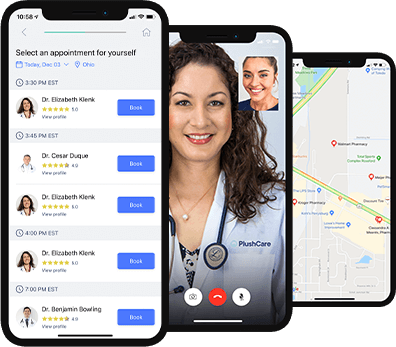Contracting a UTI From Sex
A urinary tract infection (UTI) is one of the most common types of infections. If you find that you’ve contracted a UTI after sex, you might be wondering how UTIs and sex are connected and how to avoid UTIs when sexually active.
Here, we’ll help answer these questions and provide some useful information about UTIs and their connection to sex.

1
Book on our free mobile app or website.
Our doctors operate in all 50 states and same day appointments are available every 15 minutes.
2
See a doctor, get treatment and a prescription at your local pharmacy.
3
Use your health insurance just like you normally would to see your doctor.
What Is a Urinary Tract Infection (UTI)?
An infection anywhere along the urinary tract is called a urinary tract infection (UTI). The urinary tract is made up of six organs that remove waste and excess water in the form of urine from the body.
These organs are:
The two kidneys
The two ureters
The bladder
The urethra (the urethra connects the bladder to outside the body so you can urinate)
When bacteria enter the urethra, it can use urine and cells as food to multiply and develop into an infection. The bacteria that account for about 90 percent of all uncomplicated UTIs are Escherichia coli, or E. coli. The main causes of a UTI include:
Improper wiping (i.e., from back to front)
Toilet backsplash
Unprotected anal sex, which increases the likelihood of the bacteria from the anus area entering the urinary tract
“Infection limited to your bladder can be painful and annoying,” according to Mayo Clinic.
“However, serious consequences can occur if a UTI spreads to your kidneys.” As a result, it’s important to seek medical care if you’re experiencing any UTI symptoms.
Can You Get UTI From Sex?
Yes, it is possible to get a UTI from sex. While having sex does not mean you will develop a UTI, sex can increase your risk of infection by irritating the urethra or introducing bacteria into the urinary tract.
The urethra is a thin tube that connects the outside of the body to the bladder. When the urethra becomes irritated or inflamed, it is much easier to develop an infection in the bladder. Sometimes, bacteria that is in or near the vaginal opening can be moved into the urethra during penetration. Bacteria on your partner’s penis or on a penetrating toy can also enter the urinary tract.
UTI and Sex: Can Sex Cause UTI?
Yes, it is possible to develop a UTI from sex. E. coli, the bacteria responsible for about 90 percent of uncomplicated UTIs, are commonly found in the gastrointestinal (GI) tract. This makes protected or unprotected anal sex a common cause of UTI after sex. Since E. coli can be found in feces and around the anus, there is an increased risk of bacteria entering the urinary tract of male partners during unprotected sex or entering the urinary tract of female partners from contaminated penis, condom or sex toy.
Other types of bacteria can be transferred to the urinary tract during sexual intercourse and sexually transmitted, such as:
These infections are contained to the reproductive organs and urethra. This means they generally lead to infections in the lower urinary tract only, which includes the urethra and bladder.
While a UTI is not a sexually transmitted disease (STD) and not contagious, the bacteria that can lead to an STD can be transferred to your partner.
What Is Honeymoon Cystitis?
Honeymoon cystitis is a type of urinary tract infection. Cystitis is the medical term for an infection in the bladder that can cause pressure and cramping in the lower abdomen and burning urination, as well as difficulty urinating and no fever. Usually, the lining of the urethra and bladder becomes inflamed and irritated.
Frequent sexual intercourse can increase the chance of bacteria entering the urinary tract and the vagina being irritated when insufficient lubrication is used. The increased friction from insufficient lubrication during vaginal sex can irritate the woman’s urethra, leading to inflammation.
This can make someone more susceptible to an infection, as irritated tissues help create an environment where bacteria can linger and thrive. The term was coined because couples can have frequent sex in a short span of time during their honeymoon or women had their first intercourse in their life or after longer abstinence.
Other Risk Factors of UTI From Sex
In general, women are at higher risk than men when it comes to developing a UTI from sex. This is mostly due to anatomy. Women anatomically have shorter urethras than men do. Women’s urethras are also closer to the anus, making it easier for bacteria to accidentally be transferred into the urethra.
For men, anyone who has not been circumcised may be at greater risk of urinary tract infections as bacteria has a greater chance of building up. It is rare for men younger than 70 years old to contract a UTI, the chance of UTI in men increases as men become older.
Other risk factors specific to women that could make them more susceptible to developing a UTI after sex include:
Certain birth controls: Using diaphragms or spermicidal agents as birth control increases a woman’s risk of developing an infection because of bad hygiene.
Menopause: A decline in circulating estrogen after menopause leads to changes in the urinary tract that can make women more vulnerable to infection.
Underwear and pant types: Buildup of moisture around the vagina creates a favorable environment for bacteria, so wearing tight-fitting pants or non-breathable underwear can lead to UTI. Thongs or G-strings that chaff can also cause irritations.
Feminine products: Soiled sanitary pads and tampons can create a breeding ground for bacteria and should be changed often. Other products that can irritate the vagina, including douches, sprays, perfumes, and harsh soaps, also increase risk of infection.

1
Book on our free mobile app or website.
Our doctors operate in all 50 states and same day appointments are available every 15 minutes.
2
See a doctor, get treatment and a prescription at your local pharmacy.
3
Use your health insurance just like you normally would to see your doctor.
How To Prevent UTI After Sex
Although all UTI causes cannot be entirely avoided, there are steps you can take to reduce your chances of getting a UTI from sex. These include:
Urinating when you need to and always trying to empty your bladder fully
Practicing safe sex to avoid contracting any bacteria from sexually transmitted diseases
Taking showers instead of baths
Urinating soon after sex to flush out any bacteria that may have entered your urethra
Washing your genital area after sex
Wearing cotton underwear and loose fitting clothing that doesn’t trap moisture
Common treatments for a UTI can include antibiotics or even surgery depending on the severity and cause of the infection.
If you experience any symptoms of a UTI or STD, call or book online with PlushCare to set up an online appointment with a top U.S. doctor today.
A PlushCare doctor can diagnose and treat your UTI. If you need an antibiotic prescription, your doctor can write you one and have it sent to your local pharmacy. Treating your UTI has never been easier.
Read More About Urinary Tract Infections
Sources:
PlushCare is dedicated to providing you with accurate and trustworthy health information.
Mayo Clinic. Urinary tract infection (UTI). Accessed on January 29, 2021 at https://www.mayoclinic.org/diseases-conditions/urinary-tract-infection/symptoms-causes/syc-20353447
National Library of Medicine. Journal of Clinical Epidemiology. Health behavior and urinary tract infection. Accessed on January 29, 2021 at https://pubmed.ncbi.nlm.nih.gov/2324774/
Kids Health. Urinary Tract Infections (for Teens). Accessed on January 29, 2021 at https://kidshealth.org/en/teens/uti.html
Urology Care Foundation. Understanding UTIs Across the Lifespan. Accessed on August 27, 2021 at



